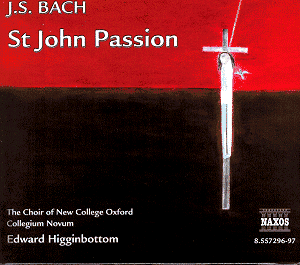Only the other day I was writing for this web
site a review
of this great work in which I said, that in all the many recordings
available there were very few recorded by males voices (with boys
on the top line) and also with period instruments. I was writing
this in the context of the recording by Kings College Choir and
the Brandenburg Consort under Stephen Cleobury (Brilliant Classics
99050) a budget price disc. Well, here we have another budget
label offering a new St. John with an all-male cast and with period
instruments.
Kings College drew on the services of the experienced
Catherine Bott as a soprano soloist. Here New College use a boy
treble (though listed as a boy soprano), the excellent Joe Littlewood,
to sing two solo numbers, ‘Ich folge dir gleicfalls’ in Part 1
and ‘Zerfliebse, mein herze’ in Part
2. This really is an all-male show.
The aforementioned ‘Brilliant Classics’ double
album which runs for well over two hours also includes the appendix,
some items added by Bach in later years. This Naxos recording
offers us the ‘normal’ version and is therefore much shorter overall.
The cast is less star-studded than the Kings version but that
does not matter in the least; in fact Higginbottom has assembled
a team of past and present New College Choristers who are now
attempting to make it in the profession. The booklet gives us
photos and biographies. John Bernays was in the choir in the late
1980s, Eamonn Dougan in the mid-nineties. This is a fine team
of soloists and it is especially wonderful to hear a New College
chorister from the 1960s, the wonderful James Bowman, on such
fine form. It seems many years ago now, probably in the days of
David Munrow, when his tone collapsed into an overworked hoot.
Now in his fifties he is singing better than ever.
In case you have your doubts that the chaste
sounds of unbroken English boys voices are really suitably powerful
or able to convey the emotional quality of the music, its worthwhile
remembering that New College under Higginbottom has, for at least
twenty years, been recording not only Byrd and Purcell but also
a great deal of Continental baroque music. They have concentrated
especially on the French repertoire. Accoridngly they have cultivated
a more ‘foreign’ sound than one might normally find in Oxford,
if not Cambridge. This sound is rather front of the mouth, with
a controlled if sometimes rather forced vibrato. Higginbottom
also favours rather clipped vowels and particular firm placement
of the consonant at the end of words. Whilst all choral directors
try to achieve this it does not always work. For instance it can
be irritating in the extreme in the many fugal choral/crowd scenes
to hear hissing ‘esses’ at every moment. In chorus number
21, ‘Wir haben ein Gesetz’ the crotchet on ‘setz’ is clipped to
half of its length to place the consonant on the second half of
the beat. The effect is that the ‘tz’ is over-emphasized and due
to the shortness of the note the quaver rest becomes extended.
There is a battering of ‘tzes’ from all corners. The acoustic
of the chapel is excellent of course but these consonants bounce
strongly off the walls especially in the crowd numbers. In fact
you may have to get used to the acoustic which might appear a
little muddy. Later on it seems less of a problem and I suspect
that one’s ears soon adjust.
Whereas the St. Matthew Passion is, in its three
hours, more of a meditation on the Passion of Christ, the St.John
Passion, in its succinctness, is more dramatic. The booklet notes
by Jeremy Siepmann remark that the work is "almost unbearable
in its intensity and vividness … and far exceeds much baroque
opera in its dramatic scope and theatrical flair". Quite
a statement, but the work is said in many a textbook to be the
opera that Bach never wrote. New College Choir do not totally
capture the ‘theatrical fire’, but to be honest it’s not entirely
necessary. What matters is to create a version that the listener
will be happy to replay without finding anything which jars or
annoys too much.
I can recommend this version if you want period
instruments, which I must say are wonderfully and sensitively
played. This kind of Bach performance is ‘de rigueur’ nowadays
and I will be happy to play and use this recording with alacrity.
Gary Higginson
